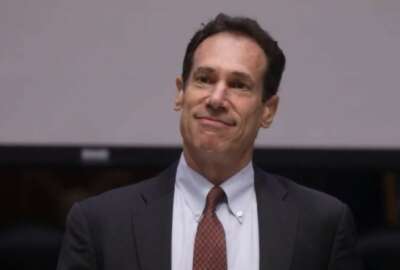This agency’s whistleblower program has paid out billions of dollars
The Securities and Exchange Commission (SEC) received 18,000 tips from would-be whistleblowers in 2023. Since starting its whistleblower program in 2011, the SEC...
The Securities and Exchange Commission (SEC) received 18,000 tips from would-be whistleblowers in 2023. Since starting its whistleblower program in 2011, the SEC has paid tipsters some $6.3 billion. The Federal Drive with Tom Temin next guest has some insight on all of this. He’s whistleblower attorney and partner at Youman and Caputo, John Crutchlow.
Interview Transcript:
Tom Temin And the SEC does come up regularly as kind of a model for whistleblowers. I guess, they established their program in the distant aftermath of the Madoff scandals, which the SEC somehow turned a blind eye to and really got religion. Sounds like.
John Crutchlow Yeah. The, the whistleblower program, came out in about 2011 and has been a really a tremendous success over the last, more than a decade at this point. The, nonprofit Better Markets recently, issued a report suggesting that whistleblower tips have resulted in over $6 billion in monetary sanctions against, folks who have violated the securities laws. So really has been a big boon to SEC enforcement efforts over that time.
Tom Temin Should people go directly to the SEC? Should they get a lawyer first? I mean, what’s the best practice here for the whistleblower?
John Crutchlow Every situation is certainly unique. First and foremost, if somebody would like to file anonymously, the law requires them to hire a lawyer to do that. But even if they don’t want to file anonymously, there are a lot of advantages to working with a lawyer who’s experienced not only with the securities laws, but also with the whistleblower program. First, the lawyer can help with assessing the strength of the whistleblower’s evidence in light of the applicable law, and can help identify gaps in the evidence or blind spots that might exist, and can provide advice if possible in how to fill those gaps. The lawyer can also provide, I think, pretty invaluable help in preparing a whistleblower submission to highlight the evidence and the issues most likely to be of interest to the SEC, and in a way that will eventually, hopefully be most helpful to an SEC investigation. It also can often be helpful to have a dialog with somebody in the SEC enforcement division before submitting a tip, and the lawyer can help with these things.
Tom Temin If a lawyer who is external decides to go on with this and help the whistleblower, because there could be a good reward eventually from the SEC, will a lawyer, will you work on the basis of that future settlement or payout? Or does the whistleblower need to make that investment themselves?
John Crutchlow Most lawyers who practice in this area, I find, do work on a contingency basis. So most lawyers who will represent whistleblowers in a case like this will not get paid unless there is an award paid to whistleblower at the end of the case.
Tom Temin Which I would think would make you selective about which cases you take on.
John Crutchlow Certainly, yes. It doesn’t help anybody to try to bring a case to the SEC that is not meritorious.
Tom Temin Right. And that takes even the good cases, though, takes some patience on everybody’s part. It takes time to get these things settled, discovered and settled and decided.
John Crutchlow Yes. I think, any lawyer in this area is going to spend a lot of time upfront working with the client to make sure that the case is one that actually has a good chance of being successful.
Tom Temin We are speaking with whistleblower attorney John Crutchlow. He’s a partner at Youman and Caputo. When someone is protected in that manner, though, they’re still out of work. Even though the SEC is going after the company, that’s great. What happens to the person then?
John Crutchlow Well, again, I think if, the company would have to know that the person is an SEC whistleblower for them to be fired for that, and the company would face pretty drastic consequences if they identify the person as an SEC whistleblower and then fire the person. But, yeah, it can happen. And one of the big, obviously, one of the most well reported aspects of the whistleblower program are the financial incentives that come with it. And that is to help compensate people for the risks that they take. And the whistleblower program has paid out, a considerable number of awards, over the years, including some pretty substantial awards over the years. I think that the program has paid something like $2 billion to almost 400 whistleblowers over the last decade plus. So there are pretty substantial financial awards.
Tom Temin Some others have pointed out a couple of problems with the SEC program. What, in your opinion, should they still do to make it up to full greatness, if you will, for whistleblowers?
John Crutchlow Yeah, the SEC whistleblower program has undoubtedly been incredibly successful. It has been a real boon to SEC enforcement efforts, over the years without any question. I think if there were room for improvement, I think there are definitely a couple areas where the program could be improved. One of them is the amount of time it takes between when the SEC resolves an action, that qualifies for a whistleblower award. Between when a whistleblower applies for that award and the money is actually paid can be, quite a long time, can be well over a year can be sometimes mean more than two years. So I think the law could be strengthened if there were some pretty hard and fast deadlines in place for the SEC to pay awards, to qualify whistleblowers. In addition to that, I think the law could be improved to prevent retaliation or to give the SEC enforcement authority to bring an action for retaliation against somebody who is a whistleblower, has raised appropriate issues internally and is retaliated against for that before they have become a formal SEC whistleblower, before they’ve actually submitted a tip. So in order for the SEC to take enforcement action against a company for retaliating against a whistleblower, that person has to have already filed a tip with the SEC. If they have not yet done so, the SEC doesn’t have authority to go after, a company, for example, for, bringing retaliatory action. So, I think the law could be strengthened by allowing the SEC to do so, even if a person is not yet a, formal SEC whistleblower.
Tom Temin Yeah. So that would be a statutory requirement to change that.
John Crutchlow The rules would have to change for sure.
Tom Temin The rules or the law?
John Crutchlow The law would have to change, and the implementing regulations would have to change. And ultimately, the SEC took the position that it was entitled to take that action. But the Supreme Court, interpreted the existing law as saying that somebody would have to actually be an SEC whistleblower, defined as somebody who’s actually filed a tip with the SEC in order to for the SEC to take enforcement action against the company for retaliation. So that was, basically an interpretation that the Supreme Court made, which is the law of the land today and can be fixed by a change to the law.
Tom Temin And with respect to whistleblower practices across the government. Is the SEC a model for other agencies that could improve their programs, do you think?
John Crutchlow The SEC is a fantastic model. I think that it, has been very, very successful. There is certainly a culture inside the SEC that, I was an SEC attorney myself. I have now been practicing before the SEC, as a whistleblower attorney. And, I can tell you that the SEC culture is pro whistleblower. I think that whistleblowers are respected. There are confidentiality is protected when possible. The retaliation provisions are enforced when possible. So I think that culture is something to be applauded, and it’s something that other agencies could adopt as well. And the process in place. The very good sophisticated SEC enforcement attorneys are reviewing every single whistleblower submission that comes in the door. And not all of them are assigned for investigation, with 18,000 tips coming in the door. It is certainly not the case that, every single one that has good information gets assigned. But you can be assured that a good, sophisticated SEC enforcement attorney is going to put eyes on your submission. And that’s a good confidence to have. And I think a lot of other agencies could benefit from that model.
Tom Temin And we should point out, too, that the SEC can only hear financial irregularities if there’s some EEO type of violation or something in some other area than finance, then you got to go somewhere else anyway.
Copyright © 2025 Federal News Network. All rights reserved. This website is not intended for users located within the European Economic Area.
Tom Temin is host of the Federal Drive and has been providing insight on federal technology and management issues for more than 30 years.
Follow @tteminWFED






